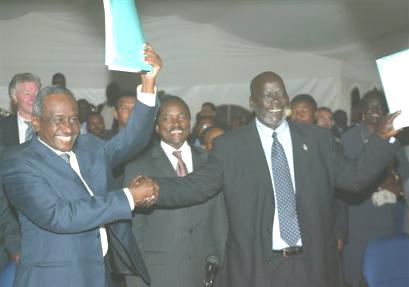Sudan govt, SPLA sign deal paving way to peace

By Katie Nguyen
NAIVASHA, Kenya, May 26 (Reuters) – Amid whoops of joy and thanksgiving prayers, Sudan’s government and southern rebels signed key accords on Wednesday paving the way to a comprehensive end to Africa’s longest-running civil war.
The deal does not cover a separate conflict raging in the western Darfur area, where more than a year of fighting has created what the United Nations says is one of the world’s worst humanitarian crises.
But officials of the Khartoum government and the rebel Sudan People’s Liberation Army (SPLA), signing the accords at a ceremony northwest of Nairobi, said they hoped the move could help bring peace to the whole of the vast oil-exporting country.
The pacts clear the way for an eventual deal to halt a 21-year-old war in the south that has killed an estimated two million people, mainly through famine and disease, and uprooted four million in a country four times the size of France.
“Things will not and can never be the same again,” SPLA leader John Garang told a signing ceremony, drawing cries of joy from south Sudanese women supporters in brightly colored gowns.
“We have reached the crest of the last hill in our tortuous ascent to the heights of peace. The remaining (terrain) is flat,” he said after Christian and Muslim leaders offered prayers of thanks.
Garang suggested the deal could give fresh impetus to peace efforts in Darfur. “We hope this peace agreement will have a favorable knock-on effect on the situation there,” he said.
“We thank God Almighty who led us to this great achievement,” said Khartoum’s top negotiator, First Vice President Ali Osman Mohamed Taha, adding he hoped the deal would advance peace efforts throughout Africa’s biggest country.
The agreements settled the status of three disputed areas — the Nuba Mountains, Southern Blue Nile and Abyei — and set up postwar power-sharing arrangements.
The war began in 1983 and broadly pits the SPLA in the mainly Christian and animist south against the northern Islamic government. It has been complicated by issues of oil, ethnicity and religion.
Weeks of stagnation in the negotiations had raised diplomatic concern that the longer the process dragged out, the greater the possibility for breakdown.
PUSH FOR PEACE
Some mediators had feared the conflict in Darfur might derail the talks in Naivasha, after the SPLA voiced sympathy and encouragement for the region’s anti-Khartoum insurgency. The Darfur rebels’ demands for a share of power and resources are very similar to the SPLA’s complaints of marginalization by the Islamist government in Khartoum.
In Washington, State Department spokesman Richard Boucher, speaking before the agreements were signed, dangled the prospect of a White House ceremony to mark a comprehensive peace deal but said this might depend on Khartoum ending the Darfur conflict.
The United States has a special interest in Sudan, which it lists as a “state sponsor of terrorism” because of Khartoum’s record of hosting militant Islamists including Osama bin Laden in the early 1990s.
Commentators said achieving a comprehensive peace in Sudan remained a daunting task.
“Ending the war in the south is a huge step forward, but in the western part of the country the Sudan government is taking a terrible step backward,” said Jemera Rone, one of the world’s top Sudan experts and a researcher at Human Rights Watch.
“The government’s campaign of ‘ethnic cleansing’ in Darfur raises real questions about whether Khartoum is really willing to comply with today’s peace accord in the south.”
In the past two years of negotiations the two sides agreed to split state and religion, form a post-war army and allow a referendum on independence in the south after an interim period.
The government and the SPLA agreed in January on an equal split of oil revenues — now exceeding $2 billion a year from 300,000 barrels per day — during a six-year transition period.
(Additional reporting by Wangui Kanina in Naivasha and Nima Elbagir in Khartoum)
